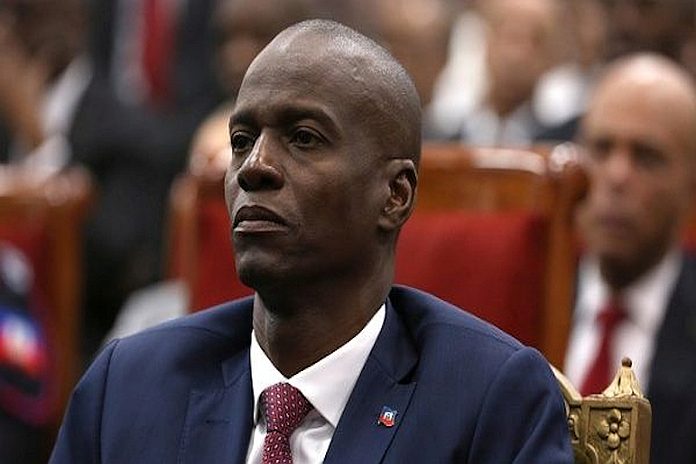UN condemns ‘abhorrent’ assassination
NEW YORK, USA – Perpetrators behind the assassination of Haitian president Jovenel Moïse must be brought to justice, the United Nations said on Wednesday. UN Secretary-General António Guterres has condemned the incident in the strongest terms, according to a statement issued by his Spokesperson, Stéphane Dujarric.
An ‘abhorrent act’
“The secretary-general calls on all Haitians to preserve the constitutional order, remain united in the face of this abhorrent act and reject all violence”, it said. President Moïse, 53, was shot dead in an overnight attack in his private residence in Haiti’s capital, Port-au-Prince. His wife, Martine, was also injured and is receiving treatment, according to media reports.
The entrepreneur and politician was elected in November 2016 and began serving the following February. Guterres has extended his deepest condolences to the people and government of Haiti, and to the family of the late president. The UN will continue to stand with the government and the people of Haiti, the statement continued.
Multiple challenges
Haiti is the poorest country in the Americas, and has experienced serious political, economic and humanitarian challenges in recent years.
Six prime ministers have been appointed since the late president took office, with a seventh appointed this week who has yet to be sworn in.
Last month, the top UN official in Haiti, Helen La Lime, briefed the Security Council on the worsening socioeconomic conditions in the country, rising gang violence, resurgence of COVID-19, and the “ever-growing polarization of Haitian politics”.
She said despite several Haitian-led mediation efforts, “the deep-rooted political crisis which has gripped the country for the better part of the last four years, shows no sign of abating”, while the rhetoric used by some political leaders was growing increasingly acrimonious.
Security council sorrow
Speaking at the outset of its meeting on Wednesday, Security Council president ambassador Nicolas de Rivière of France said members were saddened by the death of the Haitian leader.
“The members of the Council express their deep shock at the assassination of president Moïse, which occurred earlier today in Port-au-Prince, and their concern at the fate of the First Lady, Martine Moïse, who was also shot in the attack,” he said.
The 15 ambassadors also expressed their deep sympathy to the family of the late president, and to the government and people of Haiti.
BELIZE, Belmopan – In tribute to the late president of Haiti Jovenel Moïse, the government of Belize orders that all national flags and CARICOM Standard flags are flown at half-mast for three days starting today, July 7, 2021.
The government of Belize joins the Caribbean Community in this symbolic gesture of condolence as the people of Haiti mourn the death of President Moïse, who was assassinated in his home on July 7, 2021. Flags will also be flown half-mast on the day of president Moïse’s funeral, which will be announced later.
BRIDGETOWN, Barbados – Dr Hyginus ‘Gene’ Leon, president, Caribbean Development Bank on the death of Haitian president Jovenel Moïse, said:
“All of us at the Caribbean Development Bank (CDB) are deeply saddened by the killing of Haitian President, Jovenel Moïse and the wounding of his wife, First Lady, Martine Moïse. We offer our most sincere condolences to the entire nation, especially the family and friends of the late president and Mrs Moïse.
“The CDB pledges its continued support for the country’s development efforts as it faces social and economic development challenges and the effects of natural hazards. CDB desires calm and stability for the entire nation in the days ahead.”
KINGSTON, Jamaica – The UWI Regional Headquarters, Jamaica. The assassination of president Moïse of Haiti is the latest dramatic reflection of the culture of murderous political violence that has typified the colonisation of the Caribbean, and whose legacy continues to speak to the devalued worth of black life especially in our hemisphere.
For the people of Haiti and the wider Caribbean region who have politically united for mutual survival with dignity under the banner of CARICOM, this blunt and brutal execution of the democratically elected head of state foregrounds the historic savagery long fought against in our region’s struggle to forge a humane and sophisticated post-colonial Caribbean civilisation.
Political murder and social mayhem have long been the management tools used to maintain the misery and marginalisation of the Caribbean as it marches inexorably to the rendezvous of democracy as a freedom victory.
No country in the modern world has paid as great a human and material price as Haiti in seeking to convert its rubble of bloody imperial domination into a viable democratic nation-state. In this regard, the murder of Moïse is the latest in a legacy that includes political leaders such as Walter Rodney and Maurice Bishop.
His political execution reflects but an element in the internal political gridlock many Caribbean societies face in their effort to detach from the colonial scaffold with its endemic thirst for violence, and advance to a peaceful domestic democratic idealism. The University of the West Indies is dedicated to this process and transition and mourns the lost life of president Moïse.
I recall the intellectual elegance and charismatic charm of his chairmanship of the Meeting of the Conference of heads of government of CARICOM in Port-au-Prince in February 2018 when he made this statement:
“I am not a graduate of The University of the West Indies, but I am an academic product of it. As a student here in Haiti, I was raised on the scholarly output of the great University of the West Indies and I have an affinity for it.”
May his soul return in peace and its passage serve as a light to lead us out of this darkness.





